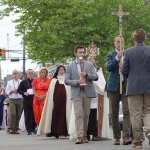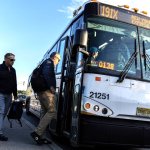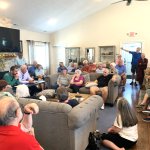TRENTON – With the goal to improve education in New Jersey schools for children who are deaf, hard of hearing or deaf-blind, two pieces of legislation sponsored by Assembly Democrats Dan Benson, Nicholas Chiaravalloti, Raj Mukherji, Ralph Caputo, Mila Jasey, Annette Quijano and Pamela Lampitt were signed into law Aug. 5 by Acting Gov. Sheila Oliver.
“No longer will we treat deaf or hard of hearing children as second class students or with expectations separate from that which we would have for any of our children,” stated Benson (D-Mercer/Middlesex). “These laws help both parents and students to ensure they are receiving the best education and given the best opportunities using multi-modal means of communication at school.”
The first law (formerly A-1893) establishes a Working Group on Deaf Education to make recommendations on issues related to early linguistic developments of children who are deaf or hard of hearing.
This group, established within the Department of Education (DOE), would consist of 12 members appointed by the Commissioner of Education.
“All our children are unique. Parents with children who are deaf or hard of hearing face additional obstacles,” stated Chiaravalloti (D-Hudson). “This law provides parents the support needed so they can make informed decisions about the medical, linguistic, and educational management of their child.”
The group will examine, research, and make recommendations to the DOE for the development of a resource guide for parents to monitor and track their children’s expressive and receptive language acquisition and developmental stages toward English literacy.
The group would also select one or more early intervention assessments to be used by educators to assess the language and literacy development of deaf and hard of hearing children.
“The hardships that parents of deaf or hard of hearing children go through are unique,” stated Mukherji (D-Hudson). “Providing a parent resource guide that will be made with recommendations from parents who are personally putting their deaf or hard of hearing children through school will undoubtedly provide support that may be hard to find for other parents.”
The law also directs the DOE, in consultation with the Department of Health, to develop a parent resource guide. The guide will:
1. help parents monitor and track deaf and hard of hearing children’s expressive and receptive language acquisition;
2. be appropriate for use, in both content and administration, with deaf and hard of hearing children from birth to age five;
3. be written for clarity and ease of use by parents;
4. be aligned to existing instruments used by school districts to assess the development of children with disabilities pursuant to federal and state law;
5. include a statement that the parent resource is not a formal assessment of language and literacy development; and
6. include a statement that a parent may bring the parent resource guide to a child study team meeting for purposes of sharing observations about the child’s development.
“This law will provide parents of deaf or hearing impaired children with vital and relevant information so they can advocate for their children and ensure they meet their potential despite their challenges,” stated Caputo (D-Essex).
“The importance of reliable and up-to-date support for parents’ decisions is critical to the overall well-being of their child,” stated Jasey (D-Essex/Morris). “This law provides both support and comfort for parents with a common interest — the well-being of their children and their education.”
In June, the measure passed the full Assembly 77-0 and the Senate 37-0.
The second law (formerly A-1896) establishes the “Deaf Student’s Bill of Rights.” This measure would require school districts to recognize the rights of students who are deaf, hard of hearing and deaf-blind to:
o Provide children who are deaf, hard of hearing, or deaf-blind with individualized and appropriate early intervention to support the acquisition of solid language bases developed at the earliest possible age.
o Inform the parents or guardians of children who are deaf, hard of hearing, or deaf-blind of all placement considerations and options available to children and provide opportunities for parents and guardians to fully participate in the development and implementation of their child’s education plan.
o Strive to provide children who are deaf, hard of hearing, or deaf-blind opportunities to meet and associate with adult role models who are deaf, hard of hearing, or deaf-blind to learn advocacy skills, including self-advocacy.
o Provide children who are deaf, hard of hearing, or deaf-blind opportunities to meet and associate with their peers in the school environment and during school-sponsored activities.
o Provide direct instruction to children who are deaf, hard of hearing, or deaf-blind. If that is not possible, school districts shall provide the children with access to qualified teachers, interpreters, and resource personnel who communicate effectively with each child in that child’s mode of communication.
o Include a communication plan in the Individualized Education Program of a student who is deaf, hard of hearing, or deaf-blind. Where appropriate, public schools shall include a communication plan in the educational plan prepared for a student who is deaf, hard of hearing, or deaf-blind.
o Provide children who are deaf, hard of hearing, or deaf-blind placement that is best suited to the child’s individual needs including, but not limited to, social, emotional, and cultural needs, with consideration for the child’s age, degree and type of hearing loss, academic level, mode of communication, style of learning, motivational level, and amount of family support.
o Provide children who are deaf, hard of hearing, or deaf-blind individual considerations for free, appropriate education across a full spectrum of educational programs.
o Provide children who are deaf, hard of hearing, or deaf-blind full support services provided by qualified professionals in their educational settings. The Department of Education shall work with school districts to ensure technical assistance is available to support boards of education in meeting the needs of children who are deaf, hard of hearing, or deaf-blind.
o Provide children who are deaf, hard of hearing, or deaf-blind full access to all programs in their educational settings including, but not limited to, extracurricular activities, recess, lunch, media showings, and public announcements.
o Ensure that parents and guardians of children who are deaf, hard of hearing or deaf-blind receive information from appropriately qualified professionals on the medical, ethical, cultural, and linguistic issues of individuals who are deaf, hard of hearing, or deaf-blind.
o Ensure that children who are deaf, hard of hearing, or deaf-blind have direct access to mental health services and supporting services from qualified providers fluent in their primary mode of communication.
o Where possible, have deaf and hard of hearing adults directly involved in determining the extent, content, and purpose of all programs that affect the education of children who are deaf, hard of hearing, or deaf-blind.
“Around 96 percent of children with hearing loss are born to parents with intact hearing, who may initially know little about deafness or sign language,” stated Quijano (D-Union). “This Bill of Rights would give parents a sense of both knowledge and security when it comes to the education their children should be receiving at school.”
“Too often, our schools do not update their classrooms and lack the appropriate resources to support the communication needs of deaf or hard of hearing students,” stated Lampitt (D-Camden/Burlington). “As a result, these students fall behind not only in language development but other academic areas. This law will prioritize the language needs of deaf or hard of hearing children in order for them to grow both academically and socially at school.”
The measure passed the full Assembly in June by a vote of 77-0, and the Senate in January, 37-0.








